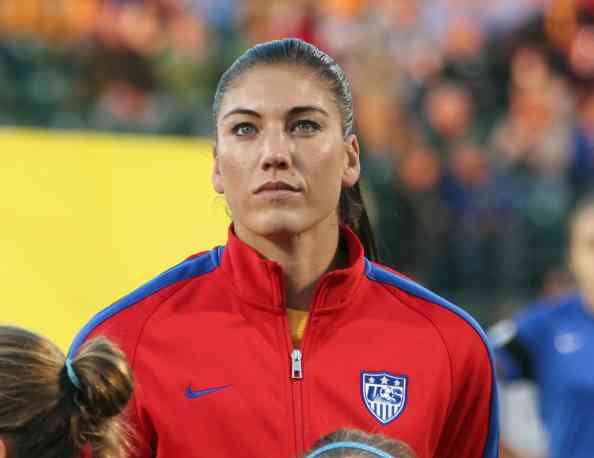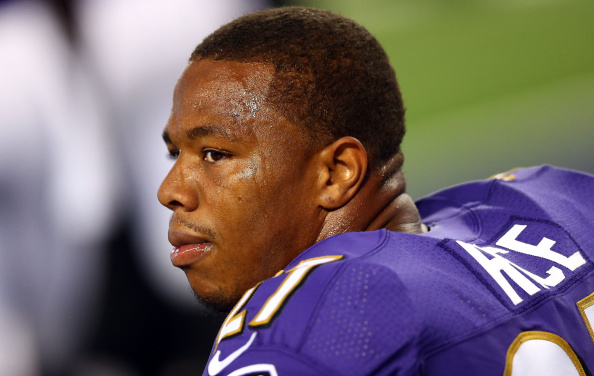Enough already with trial by court of public opinion. All around. We have courts — real courts, of law — to dispense justice. That’s what they’re for. You can like Hope Solo, or not. But her case is not like that involving Ray Rice. The notion that the two matters are the same, or ought to be treated the same, or that the U.S. Olympic Committee ought to do something in the Solo case, and do it now, because of some notion of equality or of leveling the playing field in sports thoroughly and completely misses the point.
It also fundamentally ignores reality.
The USOC -- which convenes this week in Chicago for its annual assembly -- can’t just whomp around like an 800-pound gorilla. There are laws that define what it can, and can’t, do.
Which is exactly the point that seems to be lost in all the shouting over the past couple days and weeks amid the Rice matter and, more recently, as it has dawned anew on columnists — including some of the leading voices in the United States — as well as on the Twitter mob that Solo is herself facing domestic violence charges.
It’s simple.
The United States is a nation rooted, fundamentally, in the law. We can agree, or disagree, about whether the law is applied appropriately in a particular case or not — but, big picture, that is the essence of the thing.
To continue, the law is not a one-size-fits-all. In each case, the idea is that the law is applied to specific facts. And, in each case, the accused — this is crucial — is afforded due process.
Rice, in a February altercation, assaulted his wife-to-be, Janay, at the Revel Casino in Atlantic City, New Jersey. The next month, a grand jury indicted him on felony charges of aggravated assault. At the risk of being obvious, a felony is punishable by a year or more in custody — which means state prison. We now know, thanks to TMZ, that Rice punched his fiancee in a casino elevator, knocking her unconscious.
In May, prosecutors agreed to allow Rice to enter into a pretrial diversion program, which will allow him to avoid prosecution, assuming he successfully completes the program. Typically, it takes about a year.
Solo, meanwhile, has pleaded not guilty to two counts of misdemeanor domestic violence stemming from a June incident at Solo’s sister’s home in Kirkland, Washington.
Just to pause for a second.
A misdemeanor involves a crime punishable by a year or less behind bars — that is, in county jail.
So, just to start, there’s a huge difference.
Next:
According to documents obtained by the Seattle Times, Solo charged her 17-year-old nephew, punched him in the face and tackled him. When the boy’s mother tried to intervene, Solo attacked her, too.
Police said in an affidavit that when they arrived on the scene, the boy’s T-shirt was torn and he had scratch marks on his arms and a bleeding cut on his ear.
The Seattle Times account says this, too:
"When the teen’s mother tried to intervene, Solo attacked her as well, the document says. The teen tried to pull Solo off his mother and then broke a wooden broom over her head, the document says."
The "her" in that sentence is Hope Solo. So she got a broom broken over her head, at least according to that account. Solo's attorney says she is the victim in the case, according to the newspaper.
Now there may be all kinds of reasons for U.S. Soccer to assess Hope Solo’s conduct, in this instance and over the years. But to say that the federation ought to be spurred to action now because Ray Rice beat up his fiancee in an elevator?
Ladies and gentlemen, Hope Solo has pleaded not guilty. She is due the presumption of innocence.
Indeed, on Tuesday evening, on her Facebook page, Solo had this to say: "... while I understand that the public desires more information regarding the allegations against me, I continue to maintain my innocence against these charges. And, once all the facts come to light and the legal process is concluded, I am confident that I will be fully exonerated."
What if, at trial, it turns out there are extenuating circumstances? Unreliable witnesses? Flimsy evidence? What about the broom? When in all of it did that take place, and what might -- or might not -- a jury think about that?
The Seattle Times report says the boy alleges Solo had been drinking. It also says the 17-year-old "got an old gun that did not work" and pointed it at Solo to try to get her to stop. Police, according to the newspaper account, determined it was a broken BB gun.
What if a jury of her peers finds Solo not guilty of the charges against her? What then? If U.S. Soccer moves decisively now, and she is found not guilty -- should she be punished all these months for what would turn out to be no sound legal reason?
“Abuse in all forms is unacceptable,” the chief executive officer of the U.S. Olympic Committee, Scott Blackmun, wrote USA Today in an email earlier this week.
“The allegations involving Ms. Solo are disturbing and are inconsistent with our expectations of Olympians. We have had discussions with U.S. Soccer and fully expect them to take action if it is determined that the allegations are true.”
For sure.
But until then, the USOC is not the NFL, and U.S. Soccer is not the Baltimore Ravens. That’s not how the real world works.
The USOC is not in the position of dictating to a national governing body how to run its affairs. Indeed, the Ted Stevens Amateur Sports Act prevents that very thing.
Here’s the deal:
Outrage is one thing. Justice is another. Hope Solo is due her day in court. It’s coming in November. Until then, a little calm, please, and a lot more reasonableness all around. It’s good for everyone.





